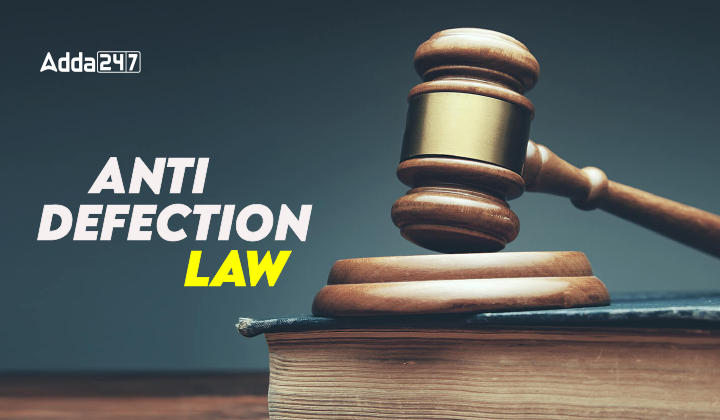Table of Contents
Anti-Defection Law- This directive emerged from a judgment related to political events in Manipur, where the Supreme Court addressed concerns over the protracted delays by Speakers in state assemblies and the Lok Sabha in deciding disqualification cases. The apex court’s declaration that three months is the ideal timeframe for such decisions aims to curb unnecessary delays that can undermine the spirit of the anti-defection law and affect governance and legislative functions. This article will explain the Anti-Defection Law which will be helpful in the Polity part of the UPSC Syllabus.
Context- The Supreme Court’s judgment regarding the time limit for Speakers to decide on disqualification petitions has been in the news due to its significant implications for political stability and the enforcement of the anti-defection law in India.
Relevance- GS-2: Anti defection law
Anti-Defection Law
The Anti-Defection Law, formally known as the Tenth Schedule of the Indian Constitution, was instituted in 1985 to address the issue of political instability caused by elected members switching parties for personal gain or other incentives. This phenomenon, often referred to by the colloquial term “Aaya Ram Gaya Ram,” became notably prevalent in Indian politics following an incident in 1967 where a Haryana MLA, Gaya Lal, changed his party affiliation three times in a single day. The law’s primary objective is to ensure political stability and uphold the integrity of the elected representatives by discouraging defection.
Key Provisions of the Anti-Defection Law
The Anti-Defection Law applies to both Parliament and state legislatures, setting forth conditions under which legislators may be disqualified:
- Disqualification for Defection: A member of a legislature is subject to disqualification if they either voluntarily relinquish the membership of their party or disobey the directives of the party leadership on a vote. This means that any member defying the party whip—abstaining or voting against the party’s directive—risks losing their seat in the legislature.
- Exceptions: The law permits a member to change parties without facing disqualification under specific circumstances, such as if two-thirds of a party’s legislators agree to merge with another party. In cases of merger, neither those who choose to merge nor those who decide to stay with the original party are disqualified.
Judicial Interpretations and Recommendations
The Supreme Court of India has provided clarifications and interpretations regarding the law’s provisions:
- “Voluntarily gives up membership” has been interpreted broadly to mean more than just formal resignation, encompassing actions and public statements that indicate a member’s departure from their party.
- Judicial Review: The law initially stated that the Presiding Officer’s decision on disqualification is final and not subject to judicial review. However, the Supreme Court overturned this provision, allowing for judicial intervention after the Presiding Officer’s decision.
Issues with the Anti-Defection Law
- Undermines Democracy: Limits legislators’ freedom, making them accountable to party leaders over the electorate.
- Lack of Timely Mechanism: No clear timeframe for defection cases, leaving decisions to potentially biased presiding officers.
- Allows Defection in Groups: Permits defection without penalty for groups constituting at least two-thirds of their party, facilitating unethical political maneuvers.
- Encourages Horse-Trading: Facilitates the unethical practice of buying and selling legislators.
- Does Not Address Root Causes: Fails to tackle underlying issues like lack of intra-party democracy, corruption, and electoral malpractices.
- Delay in Decision Making: There is no specified timeline for the Presiding Officer to decide on a disqualification plea, leading to delays that can affect the legislative process and governance.
- Impact on Legislative Independence: Critics argue that the anti-defection law compromises the ability of legislators to vote according to their conscience or the interests of their electorate, as it mandates adherence to party directives, potentially limiting constructive debate and oversight of the government.
Recommendations to Strengthen the Anti-Defection Law
- Addressing Procedural Issues
- Shifting Adjudication Power: Move decision-making from Speakers to an independent body like the Election Commission for impartiality.
- Time-bound Decisions: Implement a strict timeframe for defection case decisions to avoid political manipulation.
- Judicial Recourse: Allow direct appeals to the higher judiciary for a fair review of defection decisions.
- Strengthening Party Accountability
- Internal Democracy: Mandate regulations for internal party democracy to reduce defection motivations.
- Party Funding Reforms: Ensure transparent and accountable party funding to decrease money power influence.
- Anti-Poaching Measures: Introduce penalties for inducing defections through offers of positions or benefits.
- Balancing Stability and Accountability
- Exempting Mergers: Allow defections for bona fide party mergers, supporting political restructuring without compromising stability.
- Public Interest Considerations: Evaluate public interest in defection cases, disqualifying only when the public good is harmed.
- Right to Dissent: Protect legislators’ rights to dissent on specific issues, fostering healthy debate and independent thought in legislatures.
Recommendations for Reform
Several committees and experts have suggested reforms to the anti-defection law, including:
- Deciding Authority: Proposals have been made to shift the authority to decide on disqualification from the Presiding Officer to an external neutral body like the President or Governor, in consultation with the Election Commission, to ensure impartiality.
- Narrowing the Scope: There are suggestions to limit the application of the law to votes that affect the stability of the government, allowing legislators more freedom on other matters.
Conclusion
While the law has been instrumental in preventing rampant defections, its impact on legislative independence and decision-making highlights the need for a balanced approach that safeguards both political stability and the democratic mandate. The anti-defection law is a critical instrument in the context of Indian politics, aimed at curbing the instability caused by frequent party defections. However, it also raises questions about the balance between party discipline and individual freedom of legislators, suggesting a need for ongoing evaluation and potential reform to ensure it serves the democratic process effectively.



 TSPSC Group 1 Question Paper 2024, Downl...
TSPSC Group 1 Question Paper 2024, Downl...
 TSPSC Group 1 Answer key 2024 Out, Downl...
TSPSC Group 1 Answer key 2024 Out, Downl...
 UPSC Prelims 2024 Question Paper, Downlo...
UPSC Prelims 2024 Question Paper, Downlo...




